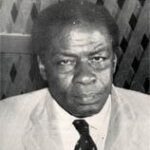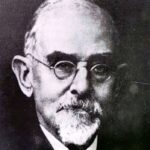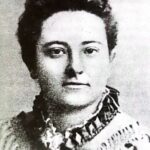FAWUNDU, FRANCIS
- 4 Min Read
Francis Fawundu (18? – circa 1920) was ruler of Mano Gbonjeima, a chiefdom near the coast in southern Sierra Leone from 1893 – 1898 and from 1899 – 1914.
He was the son of Sengbe Fawundu, who was chief of Mano before him. Francis himself was educated at one of the Mende mission schools in the Sherbro, but returned to Mano and took up trading. Mano itself is strategically located on the shore of Lake Kasseh, which is linked with the Sherbro country by the Kittam River. Combining his educational advantages and the trading opportunities offered by the location of Mano, Fawundu became a wealthy man within a comparatively short time.
In January 1892, Sengbe Fawundu died. The previous year, he had signed a treaty with T. J. Alldridge, the British travelling commissioner, receiving by its terms a stipend of £5 a year. In January 1893, Francis Fawundu was elected to succeed his father, and in 1894, he was formally recognized by Governor Sir Frederic Cardew (term of office 1894-1900).
In 1896 the British promulgated the Protectorate ordinance, placing the hinterland under British jurisdiction. Having been authorised to do so by Chief Momo Kai Kai , Fawundu addressed Governor Cardew on the subject, saying that the ordinance entirely set aside the sovereign rights of the rulers of the territories affected.
In 1897, Fawundu was a leading member of a deputation of chiefs that went to see Cardew to plead against the payment of the house tax which had just been imposed. Cardew told the chiefs to return to their homes and pay the tax. Fawundu, however, stayed on in Freetown, and informed J. C. E. Parkes, the British Secretary for Native Affairs, that “in his foreign relations” he would rather deal officially with Cardew. He added that he preferred dealing with Cardew in writing, as he found the circumstances in which the British had placed his country, his subjects, and himself “very very painful and distressing to my mind.”
Upon receiving Fawundu’s letter, Cardew instructed Parkes to inform the chief that his letter was “disrespectful and insubordinate”, and that his assertion of independence was inadmissible. Particularly irritating to Cardew was Fawundu’s signing himself as “King of Manoh,” thus, said the governor, “arrogating” to himself the position of an independent power. Fawundu was told to apologise for the “disrespectful and disloyal tone” of his letter and further directed to leave Freetown and “return to your own country within 24 hours.”
Fawundu argued logically that there was no inconsistency in signing himself “King of Mano,” for his father before him had been addressed by that title by the British, and now he had succeeded his father. He also stated that he never knew before that day that he was a British subject. Cardew considered the “attitude” of the letter “impertinent,” and declined to accept it as an apology.
On January 20, 1898, therefore, Fawundu was deposed as chief of Mano, subject to the approval of the British Secretary of State for the Colonies. The action was taken on the grounds that he had “repudiated being a British subject.” Cardew convinced the British Colonial Office that it was necessary to make a “severe example” of Fawundu as a “deterrent to others” at that particular time, since most chiefs were then in opposition to the house tax. The British Secretary of State for the colonies later approved Cardew’s action. As, however, the Colonial Office was unsure of the legality of its position, the proviso was added that Fawundu might be reinstated if he submitted to British authority.
Shortly after this, the Hut Tax War of 1898 broke out. It was suspected that Fawundu was using his influence in Freetown to induce the Mende to rebel against the British. He was therefore immediately arrested and jailed. Boakei Mina, “who has always remained a loyal chief”, was appointed to take charge of Fawundu’s chiefdom during his internment.
In November 1898, Fawundu was released and allowed to return to his home. He was reinstated as paramount chief of Mano Sakrim on January 6, 1899, “after publicly submitting” to Cardew’s authority. As a wealthy trader, he spent much time thereafter trying to improve conditions so that commerce might thrive in his chiefdom.
By 1914, Fawundu had become very old and drank too much. He was regarded as “having been a constant thorn in the side of the British government.” He was exiled from Northern Sherbro district to another part of Sierra Leone the same year and died probably not long afterward.
ARTHUR ABRAHAM





